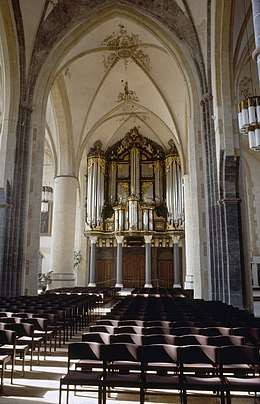Van der Leeuw-lezing
De Van der Leeuw-lezing is een jaarlijkse lezing in de Martinikerk in Groningen, genoemd naar godsdienstwetenschapper en minister Gerardus van der Leeuw. De eerste lezing – door de Amerikaanse historica Barbara Tuchman – vond plaats op 23 september 1983. Aan de wieg van het initiatief stonden de toenmalige Commissaris van de Koningin in Groningen, Henk Vonhoff en de schrijver Anton Brand. De laatstgenoemde was gedurende lange tijd voorzitter van het organiserende bestuur.

Het evenement heeft zich ontwikkeld tot een van de spraakmakende gebeurtenissen in de Nederlandse lezingencultuur en trekt jaarlijks een publiek van circa 1.200 mensen naar de Martinikerk. Dat heeft mede te maken met de formule: een referaat door een buitenlander, gevolgd door een coreferaat door een Nederlandse spreker.
Overzicht van lezingen
| Jaar | Spreker | Coreferent | Titel |
|---|---|---|---|
| 1983 | Bart Tromp | An Inquiry into the Persistence of Folly in Government | |
| 1984 | Jan Sperna Weiland | Illusions of demythologisation | |
| 1985 | Hella S. Haasse | Psycho-analysis in History | |
| 1986 | Joop Doorman | How to prove the existence of God: some reflections on the ontological proof | |
| 1987 | Joop den Uyl | The Eyes of the Lord. Hebrew Literature: The Letter and the Spirit | |
| 1988 | André Köbben | Citizenship: the new problem | |
| 1989 | Ernst H. Kossmann | Noah’s Ark or ‘The Unripe Nectarine’?: Visions of the Netherlands in the 19th Century | |
| 1990 | Hans van Mierlo | The pleasure and discomfort of a political rebirth | |
| 1991 | Aad Nuis | To be like them | |
| 1992 | Cees Nooteboom | Die Grosse Wanderung | |
| 1993 | Rudy Kousbroek | De boom van Herder | |
| 1994 | Adriaan van Dis | The changing function of the writer in the new South Africa | |
| 1995 | Rudolf van Zantwijk | Literature and History: The Epic of the Conquest of México | |
| 1996 | Kees Fens | Littérature devant le troisième millénaire | |
| 1997 | Lolle Nauta en Anil Ramdas | Amongst the Silent Stones / A Moment in Timelessness | |
| 1998 | Nelleke Noordervliet | The Enlightenment, the Dutch and the Future of History | |
| 1999 | Jan Donkers | Dangerous Ground: Landscape in American Fiction | |
| 2000 | Stephan Sanders | Quo vadis, Europa? | |
| 2001 | Barber van de Pol | The storyteller is someone else | |
| 2002 | Douwe Draaisma | Literature, Science and Human Nature | |
| 2003 | Marjolijn Februari | Beschadigde beelden. Schrijven in het rijk van de iconodulen | |
| 2004 | Luuk van Middelaar | I.O.U. - How we can end the developing world's debt crisis once and for all | |
| 2005 | Tijs Goldschmidt | Wild Fictions. Narratives of Nature and the Politics of Forests | |
| 2006 | Lieve Joris | “I speak, holding up your heart...” Cosmopolitanism, Forgiveness and leaning towards Africa | |
| 2007 | Kader Abdolah en Joris Luyendijk | Van My Lai tot Abu Ghraib | |
| 2008 | Abdelkader Benali | Religie en de Gouden Regel | |
| 2009 | Willem Vermeend | Markt en moraal | |
| 2010 | Arnon Grunberg | Requiem for the Future | |
| 2011 | Robbert Dijkgraaf | Education: internet or memory? | |
| 2012 | Geert Mak | Verhalen waar we in geloven: markt, religie, wetenschap | |
| 2013 | Sheila Sitalsing | Europa en het nationalisme | |
| 2014 | Barbara Baarsma | Economics as an Unorchestrated Orchestrator | |
| 2015 | Hans Renner | You Say You Want a Revolution: the elites and the masses in America's founding | |
| 2016 | Sunny Bergman | The Witch is Dead. Reflexions on „The Wizard of Oz“ and the Twentieth Century | |
| 2017 | Marcia Luyten | Populisme en de dekolonisatie van Europa | |
| 2018 | Annejet van der Zijl | The mirror and the Light: New Reflections on Old Stories | |
| 2019 | Anna Enquist | Laat werk: de expressieve vrijheid van oudere vrouwelijke schrijvers en kunstenaars (Late Work: the Power of the Mature Female Writer and Artist)[1] |
Externe link
Referenties
- Wilma de Rek, Schrijver Rachel Cusk: ‘Mensen zijn bang voor stilte. Met hun woorden creëren ze hun werkelijkheid’. De Volkskrant (11 oktober 2019). Geraadpleegd op 9 november 2019.